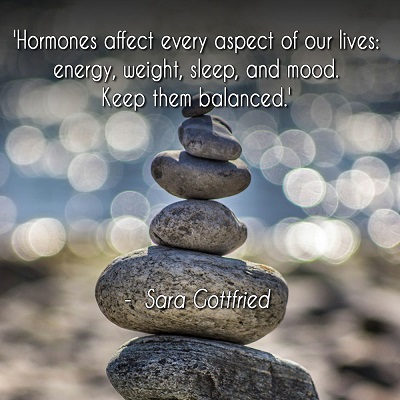 We don’t often pay too much attention to our hormones, yet they play a vital role in our overall well-being. These powerful chemical messengers affect everything in our body! So when your hormones are unbalanced, life feels dreadful; when they are working as they should, everything will feel smoother.
We don’t often pay too much attention to our hormones, yet they play a vital role in our overall well-being. These powerful chemical messengers affect everything in our body! So when your hormones are unbalanced, life feels dreadful; when they are working as they should, everything will feel smoother.
Both men and women experience hormonal shifts throughout their lives, though the specifics of these changes differ. It’s quite often women who are at the brunt of a ‘hormone joke’ but men have issues too.
For women, hormonal health is closely tied to different life stages such as menstruation, pregnancy, menopause, and post-menopause. For men, it often revolves around the gradual decline of testosterone as they get older.
A holistic approach to hormonal health considers not just your symptoms but also how your entire lifestyle can support or disrupt your hormonal balance.
What Does Holistic Hormonal Health Mean?
Holistic hormonal health is where you look at the big picture. The WHOLE picture. So instead of addressing hormone imbalances in isolation, this approach considers how your nutrition, exercise, stress levels, sleep habits, and even the products you use, influence your body’s ability to function as it should.
It’s about giving your body what it needs to maintain its own balance naturally, and this applies to both men and women.
Hormonal Health for Men
For men, hormones like testosterone, cortisol, and growth hormone govern everything from energy levels to physical performance. Testosterone, in particular, plays a key role in muscle development, libido, and emotional well-being.
As men age, testosterone production naturally declines, which can lead to fatigue, reduced strength, and mood changes. Stress and poor lifestyle choices often exacerbate these issues, spiking cortisol levels and disrupting the body’s natural hormonal rhythms.
Supporting hormonal health holistically for men, means focusing on choices that naturally optimize testosterone levels and promote overall well-being.
Foods rich in zinc, healthy fats, and protein provide your body with what it needs to maintain testosterone production.
Regular strength training can further boost hormonal balance by signaling your body to increase muscle-repairing and fat-burning hormones.
Stress management is just as important. Chronic stress is one of the fastest ways to unbalance your hormones. High cortisol levels can suppress testosterone and disrupt your sleep cycles.
Hormonal Health for Women
Women’s hormonal health is a little more complex due to the fluctuations that accompany monthly cycles, pregnancy, and the natural hormonal shifts of menopause. Estrogen, progesterone, and testosterone, yes, these are all present in women, play distinct roles in energy levels, mood, sleep, and bone health.
For many women, hormonal imbalances may show up as mood swings, weight changes, difficulty sleeping, or increased stress sensitivity. Holistically supporting hormonal health involves addressing the factors that impact these shifts, especially nutrition, stress, and the body’s need for rest and restoration.
A diet rich in omega-3 fatty acids, fiber, and essential vitamins like B6 and magnesium can naturally support hormone production and balance. Foods such as flaxseeds, leafy greens, and fatty fish provide nutrients that promote healthy cycles and reduce inflammation.
Avoiding excess sugar and processed foods is equally important, as these can lead to insulin resistance, which in turn affects other hormones, including estrogen and cortisol. For women going through menopause, there are additional steps to support hormone balance.
Phytoestrogen-rich foods like soy, red clover, and flaxseeds can help ease hot flashes and other symptoms. Herbs like black cohosh and ashwagandha may also provide support, helping with sleep, mood regulation, and reducing the stress hormones that often spike during hormonal changes.
Shared Strategies for Hormonal Balance
While men and women experience different hormonal challenges, there are universal steps you can take to support balanced hormones.
Prioritize Balanced Nutrition
What you eat is what you get! So if you want good hormonal health, eat good healthy foods! Nutrient-dense whole foods that are rich in vitamins, minerals, and healthy fats provide the essential nutrients your body needs to produce and regulate hormones.
Keep Moving
Regular exercise plays a huge role in hormonal health. Strength training is particularly beneficial for testosterone production in men, while women may benefit from a combination of strength training, gentle cardio, and stress-reducing activities like yoga.
Master Stress Management
Stress is a big disruptor of hormones for everyone. Cortisol, the body’s primary stress hormone, directly impacts testosterone, estrogen, and even thyroid hormones. Taking time to meditate, practice breathing exercises, or simply relax by taking a walk, can really help with your hormonal balance.
Rest and Recover and Help Your Hormones
Your body recalibrates its hormonal system while you sleep. So if you don’t get good sleep you can throw your hormones out of alignment. You need quality sleep for so many things, including your hormone health.
Watch Out for Toxins
Hormonal disruptors can also come from toxins which are everywhere, including your environment. Many common chemicals in personal care products, household cleaners, and even plastics mimic hormones in the body, leading to imbalances. Choose natural, organic products whenever possible to limit your exposure.
Whether you are male or female you are going to face hormonal challenges, but these challenges don’t have to upset or rule your life. With a holistic approach, you can take charge of your hormonal health.
Instead of trying to find a quick fix, or potion or lotion, focus on nourishing your body holistically, with whole foods, staying active, reducing stress, and doing whatever it takes to support hormone health.






